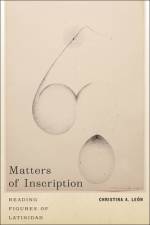- Reading Figures of Latinidad
av Christina A León
1 505,-
A compelling exploration of materiality and semiotics in Latinx inscriptions Writers and artists from Cuba, Puerto Rico, and Latinx New York operate under the pressures of inscription: the material and semiotic entanglement of making a mark as a marked artist. By employing layered material tropes and figures, such as stone, dust, viscera, and animality, their works do not represent a singular Latinx experience and instead, must be read at the margin of language and matter. Matters of Inscription explores feminist and queer inscriptions of Latinidad, encompassing the intersections of materiality and semiotics in art, performance, poetry, plays, and fiction. By delving into these figural matters, Christina A. León highlights how writers and artists such as Zilia Sánchez, Ana Mendieta, Manuel Ramos Otero, MarÃa Irene Fornés, Justin Torres, and Roque Salas Rivera forge material inscriptions that transcend individual lives and call for a broader analytical perspective unmoored from biographical anchors. The book urges readers to reevaluate the notion of difference, which has momentarily sought solace in identitarian terminology. León engages in rhetorical analysis that reassesses how the terms of Latinx studies have been challenged and how they are failing. Rather than categorizing texts based on predetermined taxonomic terms or individual subjects' lives, the book tracks figures situated at the edges of materiality and semiosis. This approach addresses the continuous marginalization and dispossession that shape the phenomenon of Latinx identity ("latinidad") by recentering conceptual questions of origin, diaspora, pedagogy, and belonging. The book contends that losses and deprivations should be rendered incommensurate to avoid collapsing the richness of different experiences or scales of ontological debasement. By focusing on the interplay of materiality and semiotics, Matters of Inscription challenges conventional approaches that seek to homogenize and anticipate what Latinx might mean and instead calls for a more capacious and nuanced analysis that goes beyond individual biographies.

